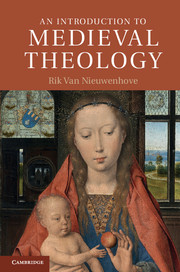Book contents
- Frontmatter
- Contents
- Abbreviations
- Chapter 1 Introduction
- Part I The legacy of the Fathers
- Part II Early medieval theologians
- Part III The eleventh and twelfth centuries
- Part IV The thirteenth century
- Part V The fourteenth century and beyond
- Chapter 17 Introduction
- Chapter 18 William of Ockham
- Chapter 19 Meister Eckhart
- Chapter 20 Jan van Ruusbroec and the Modern Devotion
- Chapter 21 Epilogue
- Bibliography
- Index
- References
Chapter 19 - Meister Eckhart
Published online by Cambridge University Press: 05 June 2012
- Frontmatter
- Contents
- Abbreviations
- Chapter 1 Introduction
- Part I The legacy of the Fathers
- Part II Early medieval theologians
- Part III The eleventh and twelfth centuries
- Part IV The thirteenth century
- Part V The fourteenth century and beyond
- Chapter 17 Introduction
- Chapter 18 William of Ockham
- Chapter 19 Meister Eckhart
- Chapter 20 Jan van Ruusbroec and the Modern Devotion
- Chapter 21 Epilogue
- Bibliography
- Index
- References
Summary
Introduction
Meister Eckhart was a Dominican Master (German: Meister) in theology, and a popular preacher. He was born in Tambach, Thüringen. The details of his earlier life are somewhat sketchy. It is possible Eckhart met Albert the Great and he may have studied with him shortly before Albert’s death. In 1293 he lectured on Peter Lombard’s Sentences in Paris but the text has not survived. After acting as prior in a convent at Erfurt and Dominican provincial in Thüringen, Eckhart returned to Paris to occupy the Dominican chair of theology. His Parisian Questions date from this period. A year later we find him back in Germany as Provincial of Saxony – a position he held from 1303 to 1311. From this period date some of his most important Latin writings, including Sermons and Readings on the Book of Ecclesiasticus, his Commentary on Genesis, and Commentary on Wisdom. At the bequest of his Order, Eckhart returned to Paris towards the end of 1311. Here Eckhart may have come across the writings of the beguine Marguerite Porete, the author of the controversial The Mirror of Simple Souls. After two academic years in Paris Eckhart went to Strasbourg, which was an important center of female piety, with numerous beguine houses and convents of Dominican nuns. Eckhart’s works written in the vernacular (Middle High German) reflect his role as spiritual director.
In 1323 we find Eckhart residing in Cologne, which is where an initial examination of the orthodoxy of his writings was to take place. This initial investigation, by fellow Dominican friars, cleared Eckhart. A second investigation was initiated at the instigation of Archbishop Henry of Cologne, and in September 1326 Eckhart was charged with heresy by a diocesan commission. Eckhart strongly refuted this accusation. He pointed out, amongst other things, that heresy is a matter of will, not intellect, that is, erroneous theological views do not make anyone a heretic; only obstinate adherence to error makes heresy. Moreover, while he admitted that, taken at face value, some of his expressions may have appeared false, when properly understood they were not, and they contained “excellent and useful truths.”
- Type
- Chapter
- Information
- An Introduction to Medieval Theology , pp. 264 - 275Publisher: Cambridge University PressPrint publication year: 2012



